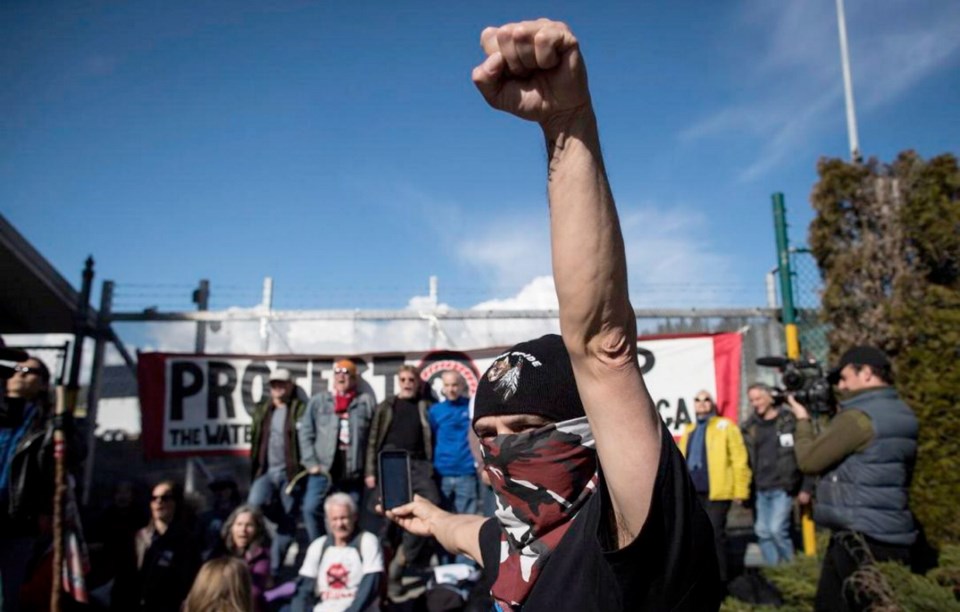On March 24, two days after my 74th birthday, I was arrested. As a retired medical doctor and professor at the University of British Columbia, running into trouble with the law is an unusual occurrence for me.
Taking the afternoon ferry from Pender Island, where I live, I arrived in Vancouver the night before a big protest against the controversial Kinder Morgan oil pipeline. The next morning, after only five hours sleep, I trudged up to Burnaby Mountain to tie myself to the gates of Kinder Morgan’s construction site, along with more than 50 other people.
Hours of snow and rain later, RCMP officers arrested me and charged me with civil contempt of the order and injunction pronounced by the British Columbia Supreme Court. Put plainly, I’d broken the court order granted to Kinder Morgan to keep protesters five metres away from its facilities. I have since appeared in court, and the charges have escalated to criminal contempt.
So, the obvious question is: Why did I — an emeritus professor of respiratory medicine — risk arrest on Burnaby Mountain?
Let me count the reasons. They range from professional to personal, and local to global.
As a physician and respiratory researcher, my expertise includes the study of the adverse health effects of particulate air pollution, which is ranked among the most important threats to human health. In Canada alone, it contributes to the premature deaths of nearly 8,000 people each year.
I’m deeply concerned that Alberta’s oilsands, which Kinder Morgan’s Alberta-to-B.C. pipeline will expand, are a leading source of air pollution, which is already affecting local communities.
Emissions from ships are substantial contributors to air pollution and greenhouse-gas emissions in docking or port areas such as Vancouver. The waters near my own home are a popular “parking spot” for freighters. There are often two to four enormous freighters parked there, fouling the ocean and the air.
Still, even these significant risks to our air and water pale compared to the dangers of a major spill of diluted bitumen, the type of oil the pipeline would carry. Evidence from the Public Health Association of B.C. suggests that a pipeline spill would expose millions of people to toxic chemicals (including known carcinogens) associated with cancer, as well as cardiovascular and respiratory problems.
It’s simply not worth the risks to human health — not to mention the consequences the project will have on marine organisms, including local orca whales on the brink of extinction.
I see the connections between these local threats and global problems that Canada needs to play a leadership role in solving.
Our current geological epoch has been called the Anthropocene, because it is dominated by human-influenced mass extinctions, climate change and a looming crisis in the availability of fresh water and food. These catastrophic trends are strongly linked to the misuse of the hydrocarbons we extract from the earth.
About eight million tonnes of plastic are dumped into our oceans each year from items such as plastic water bottles, synthetic fibres, facial scrubs and more. Plastic, of course, is made of oil and is a complex cocktail of toxic contaminants, many of which are harmful upon exposure via ingestion or inhalation.
By eating seafood, humans can consume 11,000 tiny pieces of plastic every year. Microplastics have also been found in 90 per cent of the world’s most popular bottled water brands and are even present in the air we breathe, where they can contribute to adverse health effects, along with the more familiar forms of air pollution. Plastic can even cross from the blood into the human brain or cross the placenta to adversely affect unborn babies.
It’s clear to me that mining and shipping more oilsands oil cannot be in the best interests of Canadians or future generations — clear enough that I’ve been compelled to write many letters to politicians. Since my letters didn’t stop Kinder Morgan, and large-scale demonstrations have not stopped the pipeline project, and nothing the First Nations or the province of British Columbia have done has yet been effective, I felt compelled to join the growing ranks of those getting arrested to bring this environmental emergency to public attention.
I respect the rule of law and the power of the courts to protect property, but in this instance I believe that it is necessary to act in an attempt to prevent catastrophe.
I want to be on the right side of history. In the not-too-distant future, people will say: “What were they thinking?” It won’t be me, or the nearly 200 people who were arrested protesting Kinder Morgan, they’ll be questioning.
My grandchildren and their grandchildren will be writing that history. I got arrested for them. And the truth is, you don’t need to be a doctor or a scientist to understand the urgency with which we need to act.
Dr. Peter Paré is an emeritus professor in respiratory medicine at the University of British Columbia who now lives on Pender Island.



